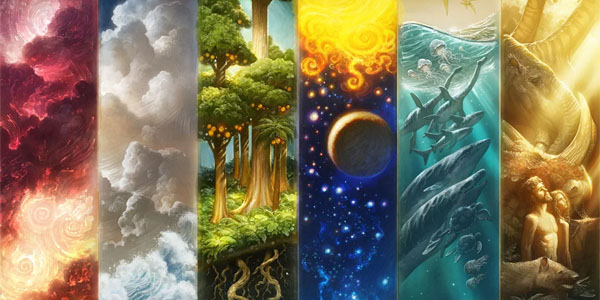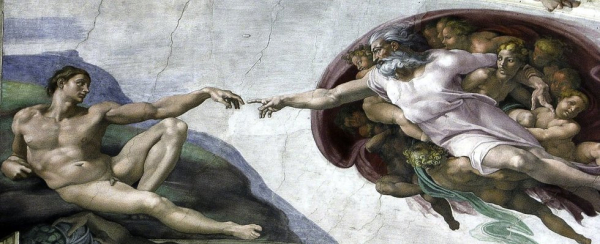文/陈凤翔 Chen Virginia | 0523/23
Our Beloved Ones Don’t Become Angels When They Die
我们所爱的亲人死了之后不会变成天使 –原译: 基督徒死后或变成天使

2023年5月14日,台湾媒体报导歌手余天和李亚萍夫妇在女儿因癌症去世后首次出现在萤光幕上,李亚萍诉说对女儿的思念与爱提及:「我女儿上了天堂……她终于成为了天使」显示出台湾人相信基督徒死后会变成天使,好人死后会成为比人类更高等的存在形式。
On May 14, 2023, Taiwanese media reported on the first TV appearance of the famous singer couple Yu Tian and Li Yaping since their daughter died of cancer. In the TV program, the couple talked about their mourning and love for their daughter, and the audience was much moved when Li said, “My daughter has gone to heaven. … She has finally become an angel.”

在台湾,抱持这种信念的人很多,我自己也听过小孩子说去世的爷爷奶奶或外公外婆变成天使,网路上也有不少「人死后会变成天使」的文章。每年清明扫墓,更常看到一些基督徒站在墓碑前,低头默祷向已故亲人诉说生活大事,期求亡者能护佑遗族,甚至也可以在基督教追思礼拜中,听到牧者如此教导或暗示这种观念。
It is not uncommon for people in Taiwan to believe their loved ones become angels (or some other forms of beings higher than humans) when they die. Personally, I have not only heard children say that about their grandparents who passed away but have also seen many internet discussions about “Do we become angels when we die?” Every year during the Qingming tomb sweepings, many people—including Christians—stand in front of the tombstones, telling their deceased loved ones about their life events and praying for blessings. The idea is even taught or implied by some pastors in Taiwan, especially at Christian memorial services.

流行文化和中国宗教的影响 Influence from pop culture and Chinese religions
但是问题是“好基督徒死后或变成天使”符合圣经和基督教正统信仰吗?
But is the belief in our becoming angels after dying consistent with the Bible and orthodox Christian beliefs?
对于台湾人而言,基督教是外来宗教。根据台湾中央研究院社会学研究所2019年公布的调查结果,在台湾人口中只有5.5%是基督徒,多数民众信奉传统民俗宗教(49.3%),佛教(14%),道教(12.4%),或没有宗教(13.2%)。多数台湾人对基督教的理解,还是从欧美电影、戏剧、小说、绘本等娱乐文化来认识。许多人——无论是基督徒或是非基督徒,皆相信好的基督徒死后会进天堂,成为天使,因为那是他们从(后基督教时代)欧美影视、流行文化中得来的印象。
To people in Taiwan, Christianity is a foreign religion. According to a survey published in 2019 by the Academia Sinica of Taiwan’s Institute of Sociology, only 5.5% of the Taiwanese population are Protestant and 1.3 percent are Catholic, with the majority of the population following traditional folk religions (49.3%), Buddhism (14%), Taoism (12.4%), or no religion (13.2%). The majority of Taiwanese still understand Christianity through the popular culture of European and American films, television programs, plays, novels, and picture books. Thus, many Taiwanese—Christians and non-Christians alike—believe that good people will go to heaven and become angels after death because that is the impression they get from such (post-Christian) pop-cultural influences.

此外,死后成为天使的信仰源于中国传统文化的影响。中国的佛教、道教、儒教和民间传统宗教都认为,“虔诚”的信徒死后会成为高于人的存在,能够保佑子孙后代。因此,在这种宗教逻辑下,可以合理推论“虔诚”的基督徒死后成为“天使”(对他们来说,这是西方对神圣化的高等生物的称呼)。
In addition, the belief about becoming angels after death stems from the influence of traditional Chinese culture. Chinese Buddhism, Taoism, Confucianism, and traditional folk religions all believe that “devout” believers become higher beings than humans after they die and can bless future generations. Therefore, Chinese religious logic reasonably deduces that devout Christians will become “angels” (which, for them, is the Western name for sanctified higher beings).
华人的儒教参天地、赞化育,修养内在的心体、性体,从普通人向上到君子、贤人、至终为永恒的圣人,教化万世。
Confucian religion emphasizes joining heaven and earth to promote all things to thrive in harmony. This is done through cultivating one’s inner heart and inner nature, starting as a normal person, then becoming a gentleman, a wise man, and finally an eternal sage, teaching and transforming all things.
佛教宇宙观为六道轮回,透过灵修往上层层爬升,从人到阿修罗、天人,至终跳出轮回,进入不生不灭的涅槃成佛,普渡众生。
The Buddhist view of the universe centers on the Six Paths. One ascends level by level through spiritual discipline, going from human to asura to deva and finally liberated from reincarnation, entering nirvana as an eternal buddha and working to deliver all people.
道教透过练炁追求长生,至终得道而飞升成仙,恩泽众人。传统民俗宗教更是「好」人死后成为神灵,保佑后辈子孙。
Taoism seeks immortality through practicing Qi, finally becoming one with the Way and flying away as an immortal to bless all people. And traditional folk religion believes that after death one becomes a spirit to watch over one’s descendants.
在这种宗教观点的影响下,人们会以为基督教灵修的目标类似力求飞升成圣、成佛、成仙的目标。
Under the guidance of such religious views, the goal of spiritual discipline becomes that of striving to ascend and become sages, buddhas, or immortals.

不符合圣经的迷信 Unbiblical superstition
然而在圣经里面,从来没有人变成天使的教义。人就是人,天使就是天使,是完全不同的受造。
However, the Bible contains no teaching of humans becoming angels or higher beings. Humans are humans, angels are angels, and the two are completely different created beings.
创世记1:1 「起初,神创造天地。」本节「天地」的希伯来文是「那诸天(הַשָּׁמַיִם)和这地(הָאָרֶץ)」。上帝创造了两个世界,一个是人肉眼不可见的超自然世界(俗称属灵世界),即「诸天」(英文是复数的“heavens”,无论是NIV还是NRS、YLT,很多英文版本都是翻译成“heavens”,更接近希伯来文原文的意思);另一个是人肉眼可见、人所处的世界—「这地」。
Genesis 1:1 says, “In the beginning God created the heavens and the earth.” The Hebrew words, הַשָּׁמַיִם for “the heavens” and הָאָרֶץ for “the earth” show that God created two worlds. The first is a supernatural world invisible to the human eye (commonly known as the spiritual world): the “heavens” (plural in many English versions, although that is not observable in Chinese translations). The other is the world visible to the human eye, the world in which humans live: this “earth.”

诗篇115:16 把这种“天地有别”的观念述说得更清楚:「天,是耶和华的天;地,他却给了世人。」(The heavens are the LORD’s heavens, but the earth he has given to the children of man.) 诸天的概念也可见哥林多后书 12:2,保罗曾提及自己被提到第三层天上,指的就是那个人肉眼不可见的「那诸天」——超自然世界。
Psalm 115:16 makes this idea of the difference between heavens and earth even clearer: “The highest heavens belong to the Lord, but the earth he has given to mankind.” The concept of the heavens is also found in 2 Corinthians 12:2, where Paul refers to himself as being caught up to the third heaven, implying that there are “heavens” invisible to the human eye—the supernatural world.
而「这地」创造的最高潮是人类。人类是照着上帝的形像(צֶלֶם)与样式所造!צֶלֶם这字也用来指君王塑像的建立。人类是上帝设立在「这地」最尊贵荣耀的受造,人类是上帝在受造世界的代表。人类六日工作,反映上帝创造天地,受造万物从人类的工作,看见上帝智慧与大能的持续。人类工作本身就是荣耀上帝的行为,人类代表上帝管理「这地」。而六日工作之后,得一日安息,无论何工都不可做。在那日,人类全心全意来纪念上帝、敬畏上帝,知道世界的运转是靠耶和华,而非人类。也在那日,人类回顾手所做的工,为自己过去六日的成就,充满上帝的智慧、创意、巧思,而感谢赞美归荣耀给造物上帝。
And the climax of creation on “the earth” was humans. Humans were created in God’s image (צֶלֶם) and likeness. The word צֶלֶם can also refer to the setting up of royal images. Humans are the most honored and glorious created beings that God has set up on this earth, and they are God’s representatives in the created world.
Humans work for six days, reflecting how God created the heavens and earth, and all created things can see God’s wisdom and power continued through human work. Human work is a God-glorifying act, and humans are God’s representatives in governing this earth. After six days of work comes one day of rest, in which no work is done. On that day, humans are to wholeheartedly remember and honor God, knowing that the world runs because of the Lord, not because of humankind. On that day, humans look back on the work of their hands and thank, praise, and glorify the Creator God for his wisdom, creativity, and brilliance reflected in these achievements.

在另一些圣经经文中则有人类与天使的比较。诗篇8:4-8,诗人观看上帝所造的天,与陈设的月亮星宿,便说:「人算甚么,你竟顾念他?世人算甚么,你竟眷顾他?你叫他比天使(אֱלֹהִים)微小一点,并赐他荣耀尊贵为冠冕。你派他管理你手所造的,使万物,就是一切的牛羊、田野的兽、空中的鸟、海里的鱼,凡经行海道的,都服在他的脚下。」从这段经文来看,人类是比天使低一等级的受造。
Other biblical passages show comparisons between human beings and angels. In Psalm 8:4–8, upon looking at the heavens God has made and at the moon and the stars he has set up, the psalmist says, “What is mankind that you are mindful of them, human beings that you care for them? You have made them a little lower than the angels and crowned them with glory and honor. You made them rulers over the works of your hands; you put everything under their feet: all flocks and herds, and the animals of the wild, the birds in the sky, and the fish in the sea, all that swim the paths of the seas.”
然而,越来越多的圣经学者认为这里原本的翻译不好(אֱלֹהִים译作天使,但אֱלֹהִים在圣经中大多翻译为「上帝」,天使有其他的字מַלְאָךְ。),较新的中文圣经纷纷将之修订。
《和合本修订版RCUV》译为「然而你使他比『上帝』微小一点,赐他荣耀尊贵为冠冕。」
《现代中文译本修订版TCV》译为「然而,你造他仅低于『你自己』;你用光荣尊贵作他的华冠。」因为诗篇8:4-8呼应着创世记第一章。
Some Christians believe this passage implies that humankind is a lower creation than angels. However, an increasing number of biblical scholars feel that in this passage “angel” is a poor translation of the Hebrew word אֱלֹהִים. It is usually translated as “God,” and other words such as מַל ְאָךְ are used for “angels.” Newer Chinese Bibles, including the Revised Chinese Union Version (RCUV) and Today’s Chinese Version (TCV), translate this verse as “You have made them a little lower than God” because it echoes Genesis 1.
诗人称颂著上帝的创造,也赞美上帝派人类代表祂,管理上帝手所造的一切万物,人类怎么有这种殊荣?从新的翻译来看,人类不是比天使低一等级的受造。
The psalmist praises God’s creation and praises God for sending humans to represent him and govern all he has created. How are humans given such a special honor?
简单的说,上帝创造了两个世界,天使、基路伯、活物是诸天世界的受造,而穹苍、诸水、陆地、日月光体、动植物与人类是在这地世界的受造。人与天使是完全不同的受造。当这地过去,新天新地来临,人也不变成天使,信耶稣的都早已跟着耶稣成为新造的人。人就是人,天使就是天使。
Put simply, God created two worlds. Angels, cherubim, and the four living creatures are the created beings of the heavenly world, whereas the sky, the waters, the land, the sun and moon, animals and plants, and humans are the created beings of this earthly world.
Humans and angels are completely different created beings. When this earth passes away and the new heaven and new earth arrive, humans will not turn into angels. Those who believe in Jesus have already become new creations in Jesus. Humans are humans. Angels are angels.
在圣经里面,人的地位可能还比天使重要。因为天使并没有照着上帝的形像与样式所造,另外天使堕落,圣子上帝耶稣也没有为他们道成肉身、死在十架上拯救。而这个观念会影响着华人基督徒对灵修的看法。
In fact, in the Bible, humans may be given more important status than angels. Angels were not made in the image and likeness of God. Furthermore, when angels fell, Jesus the Son did not become flesh and die on the cross for their salvation.

对灵修的影响 Implications for spiritual discipline
儒教的灵修目标是成圣,佛教的灵修目标是成佛,道教的灵修目标是成仙,传统民俗宗教的灵修目标是成为神灵。在成圣、成佛、成仙、成神灵的宗教观念影响下,不少基督徒会以为基督信仰的灵修目标是从人往上层层爬升,到天使,至终成为神。台湾的世界宗教博物馆对灵修的定义见下,而华人基督徒对灵修的理解亦与此不远:
「灵修是一种宗教的修行,涉及严肃的思维或沈思;此词源自于拉丁文,意谓著深奥且专注的思考。…灵修的实践可定义为在知觉上探索的一种生命新道。经历了初阶的净化与统和,修行者让自我空灵超脱以求转化新生,终至能将此觉醒整存于日常生活之中……」
“Meditation is a religious discipline, involving solemn thought or contemplation; the word originates from Latin, referring to deep and focused thought. . . The practice of meditation can be defined as exploring a new order of life through one’s consciousness. After experiencing the initial purification and harmonizing, the practitioner allows the spirit to transcend the self and so transform and renews their life, and is ultimately able to preserve this awakening in their daily life. . . ”
我们对死后会变成什么样的人的理解,会影响我们对灵修的看法。 灵修的目标,在儒教是成圣,在佛教是成佛,在道教是成仙,在民间传统宗教是成神。 受宗教成圣、成佛、成仙、成灵观的影响,台湾很多基督徒认为基督教灵修的目的是向上奋进:成为“天使”,甚至最终成为“神”。
Our understanding of what beings we become after we die affects our view of spiritual discipline. The purpose of spiritual discipline in Confucian religion is to become a sage, in Buddhism to become a buddha, in Taoism to become an immortal, and in traditional folk religion to become a spirit. Under the influence of religious views on becoming a sage, a buddha, an immortal, or a spirit, many Christians in Taiwan assume that the purpose of spiritual discipline in Christianity is to strive upward: to become an “angel” and perhaps ultimately a god.
大多基督徒对「灵修」的理解,不外乎是读经、唱诗、祷告。但有些带着成圣、成佛、成仙、成神灵的观念来实行灵修,就会引进世界诸宗教的灵修方法。
Most Christians understand spiritual discipline to generally involve reading the Bible, singing hymns, and praying. But some bring their understanding of becoming a sage, a buddha, an immortal, or a spirit into their practice of spiritual discipline, incorporating practices from various world religions—a form of syncretism.

圣经从来没有这种「人成为更高一级的受造」地位爬升的灵修概念,甚至圣经多处强调人类受造本身就是充满上帝的荣耀。读经、唱诗、祷告,都是为了更认识圣父、圣子、圣灵,了解上帝在我们身上的恩典何其浩大,在生活中所行、所做反应祂,将一切归荣耀给祂。
The Bible doesn’t indicate that spiritual discipline is for the purpose of striving to “become a higher level of created being.” In fact, the Bible emphasizes many times that humans are created beings filled with God’s glory. Reading the Bible, singing hymns, and praying are all for the purpose of learning more about the Father, the Son, and the Holy Spirit; of understanding the vastness of God’s grace in our lives; of reflecting him in all that we do; and of giving him all the glory.
若真的要说基督教的「灵修」目标是甚么?应该是圣灵所结的果子:仁爱、喜乐、和平、忍耐、恩慈、良善、信实、温柔、节制。(加拉太书5:22-23)追求现在的自己比过去的自己更懂得甚么是爱,爱上帝、爱邻舍,因为耶稣为此而来。
If we had to state a purpose for Christian spiritual discipline, I would argue that it is to cultivate the fruit of the Spirit: love, joy, peace, forbearance, kindness, goodness, faithfulness, gentleness, and self-control (Gal. 5:22–23). The purpose of spiritual discipline is to strive for the new self to better understand love than the old self did, to love God and love our neighbors. That is what Jesus came for.

圣灵保惠师帮助信耶稣的,个人生命品质渐次成长、脱去罪恶,反映上帝公义和慈爱的属性,因我们本就照其形象和样式所造。
The Holy Spirit, our advocate, helps those who believe in Jesus so that the quality of their character gradually matures. We can be set free from sin’s bondage and reflect the righteousness and love of God, because we are created in God’s image and likeness.
我们不需羡慕成佛、成圣、成仙,要知道别的受造,甚至是天使,都不是照着上帝的形象和样式所造。因此,基督徒都可称颂上帝创造我们是个人!不用认定天使是比我们更高一级的存在。我们只比上帝微小一点。祂赐我们荣耀尊贵为冠冕,派我们管理祂手所造的。主耶稣爱我们,为拯救我们,不是为了拯救天使,而死在十架上。
We need not desire the Buddhahood or immortality because we know that no other creatures—not even the angels—are made in the image and likeness of God. Therefore, Christians can praise God for creating us as human beings. We do not have to believe that angels are higher beings than we are. We are lower than God alone. He has given us a crown of glory and honor and sent us to rule over the works of his hands. Jesus loved us and died on the cross to save us, not the angels.


